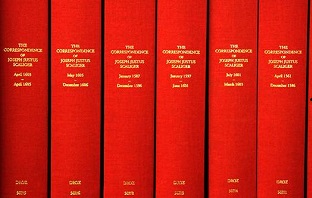The Leverhulme Trust has recently announced that that it is to fund the publication of a substantial portion of the extensive correspondence of Isaac Casaubon (1559-1614). This project, directed by Dr Paul Botley at the University of Warwick, will produce a critical edition of Casaubon’s correspondence during his last years in England, from his arrival in 1610 until his death in 1614.
When Casaubon landed in Dover in 1610, he was at the height of his powers and his international fame; by the time of his death he was widely regarded as the most learned man in Europe. However, the scale and complexity of Casaubon’s work have hampered attempts by modern scholars to make sense of his contribution to European thought. He tended to write about difficult things, and his most enduring insights are buried in his numerous, dense and lengthy commentaries. Above all, Casaubon has been neglected because his surviving correspondence is in disarray: over 40% of the letters remain in manuscript, and the rest have not been edited for three centuries. The project will continue the process of making Casaubon and his scholarship a little more comprehensible.
Dr Botley has compiled a complete inventory of Casaubon’s correspondence, and acquired copies of the manuscripts of his letters from libraries worldwide. This inventory reveals a corpus of nearly 2400 letters, written largely in Latin, but with substantial elements in French and Greek. About 1100 letters were printed in the last great edition of his correspondence in 1709, and about 200 others have since been printed in different places. Over 1000 letters remain in manuscript. Such a large and complex collection would take many years to publish in its entirety. Instead, the Warwick project has set itself the task of publishing the correspondence from Casaubon’s final years in England, in the belief that it will make his career easier to understand and its significance harder to ignore.
The project will publish Casaubon’s correspondence from his arrival in England in 1610 until his death in 1614. The edition will include all the letters which Casaubon received during the period as well as those he sent. It will contain 684 letters, of which 291 (43%) have never been published. It will be the first critical edition of the remaining letters. Every letter will be equipped with an English synopsis and full apparatus.

Listen to Paul Botley and Dirk van Miert discuss Scaliger here: https://www.culturesofknowledge.org/?page_id=588
The edition will be published in three volumes in 2018. These volumes will be prepared using the same conventions, and to the same high standards, as the letters of Joseph Scaliger (8 vols, Geneva, Droz, 2012), published by Dr Botley and Dirk Van Miert.
Publication of these letters will make sense of the previously-published portion of the correspondence; it will establish the extent and nature of Casaubon’s European network of correspondents; and it will provide a detailed context for his other printed works. Many volumes of Casaubon’s working notes and a large part of his personal library have survived in this country, and the publication of the correspondence will help researchers understand this scattered material.
The project is looking to recruit a scholar to work alongside Dr Botley for three years on the new edition of Casaubon’s letters. Applications for this position are now open. A full description of the position, and details of how to apply, may be found here: http://www.jobs.ac.uk/job/AIG503/research-fellow-74688-024/.


